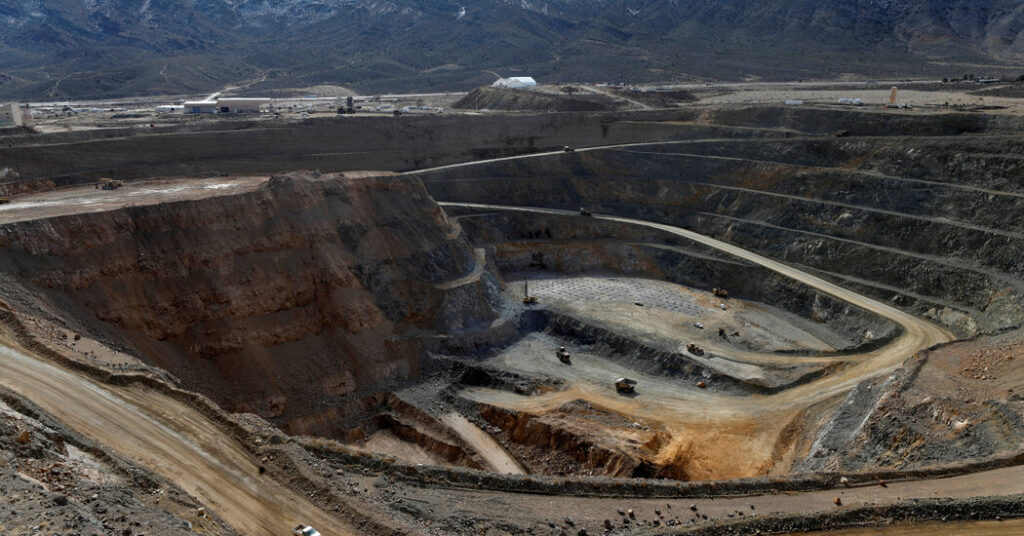The Trump administration is snapping up ownership shares of private companies it deems essential to national security. It is an unusual new strategy that has already committed more than $10 billion in taxpayer funds and shows little sign of slowing.
The government’s growing portfolio of corporate ownership involves minority stakes, or the option to take them in the future, in at least nine companies involved in steel, minerals, nuclear energy and semiconductors, a New York Times analysis found. The deals were all struck in the past six months, with the bulk made in October and November.
The effort appears mostly driven by national security concerns, particularly a desire for the government to prop up strategic industries and lessen America’s reliance on foreign countries like China for key resources. Some officials are hopeful the equity stakes will generate a windfall for taxpayers, but the likelihood of that is unclear. Many of the companies are facing financial headwinds, and some could take years to become profitable.
The unusual government intervention into the private market is fueling some concerns, including the opacity of the process, the potential for favoritism, corruption and market distortions, along with the possible loss of taxpayer funds should the investments fail.
Aaron Bartnick, a fellow at Columbia University and a former Biden White House official, said there were serious questions about whether the government role in private industry would address national security vulnerabilities and deliver a return on taxpayer dollars.
“In the absence of a clearly articulated strategy,” he said, the concern was that “this could just devolve to arbitrary deals that favor friends or disfavor foes.”
Kush Desai, a White House spokesman, defended the administration’s approach.
“If business-as-usual policies worked, America would not be reliant on foreign countries for critical minerals, semiconductors and other products that are key for our national and economic security,” he said in a statement. “The administration’s targeted equity stakes ensure that taxpayers get a good bargain and that the ball meaningfully moves forward to encourage further investment by the private sector.”
Prior administrations have tried to speed the development of sectors like semiconductors and clean energy with grants, loans, tariffs and other policies. But taking equity stakes in companies is incredibly rare. During the 2008 financial crisis, the government took over shares in companies that were faltering or whose collapse posed broader financial risks, including General Motors and Chrysler, along with the giant insurer AIG.
The Trump administration has taken a more aggressive and opportunistic tack. Trump officials have proposed establishing new price floors for minerals to help American firms remain competitive in the face of cheap Chinese imports. They have also discussed taking a cut of certain export revenues, in addition to building a growing portfolio of equity ownership.
The approach contradicts traditional Republican thinking about the power of the free market to identify winners and losers. But officials in both parties have become more supportive of industrial policy and government intervention in recent years. That shift has been brought about by China’s dominance of strategic industries, and accelerated by its move to clamp down on exports of minerals needed to make planes, semiconductors, robots and cars this year as part of a trade clash with Washington.
Daniel Kishi, a policy adviser at American Compass, a conservative think tank that supports industrial policy, said that concerns about intervening in markets rested on a “flawed premise.” Markets have already been significantly distorted by Chinese subsidies and Beijing’s efforts to monopolize global industries, he said, necessitating U.S. government intervention.
“We need an industrial policy of our own to combat the predation of our trading partners,” Mr. Kishi said.
Like past administrations, Trump officials have continued taking stakes in companies through the U.S. International Development Finance Corporation, which finances private sector projects around the world. Over the past five years, the development corporation has invested in dozens of international funds and companies.
But the Trump administration has begun using other agencies to take equity stakes as well. Many of the minerals investments are being made through the Defense Department, which has tried to develop sources of rare earths outside of China. Some deals involve the Defense Department’s Office of Strategic Capital, which was set up in 2022 and received additional funding through the Trump-backed tax and spending law passed this year to invest in critical minerals, shipbuilding and other strategic sectors.
The Energy Department has leveraged loan programs created in the Biden administration to take equity in mineral companies. The Commerce Department has also used its control of a Biden-era semiconductor fund and investments from foreign countries to begin building a portfolio.
The administration’s first significant investment took place in June when it acquired a “golden share” in U.S. Steel in exchange for allowing Japan’s Nippon Steel to buy the iconic firm. Administration officials demanded a nonfinancial stake that would give them veto power over certain company decisions, like moving factories offshore. When U.S. Steel planned to close a facility in Granite City, Ill., earlier this year, the government used its influence to intervene.
In July, the Defense Department agreed to take a $400 million stake in MP Materials, a mining company that has struggled to turn profits amid tough price pressures from China.
A month later, the Commerce Department became the largest shareholder of Intel, the beleaguered U.S. chip giant. A public filing from the Office of Government Ethics shows that, shortly after that agreement was made, President Trump personally purchased between $1 million and $5 million of Intel’s corporate debt.
The government’s equity deals gained speed as China’s export curbs intensified, putting America’s access to critical minerals and magnets at risk. In October and November, the government made a spate of investments with companies specializing in rare earths.
In October, the Commerce Department also gained the option to take an 8 percent stake in Westinghouse, the nuclear power company. The Commerce Department will help facilitate the construction of nuclear reactors across the United States. If Westinghouse’s valuation reaches $30 billion, the government can require it to carry out an initial public offering, with the right to purchase a fifth of the new public company.
Trump officials have speculated about taking stakes in more firms, in industries including mining, semiconductors, technology and defense.
Not all companies have welcomed government investment. Some firms been reluctant to meet with Trump officials out of fear the government would pressure them to hand over parts of their company, according to industry executives. Intel agreed to do its equity deal with the government after Mr. Trump called for its chief executive to fired over ties to China.
Officials and analysts have also questioned how much due diligence the Trump administration is performing. While the Biden administration took many months to evaluate targets for grants and loans, and was often criticized for moving slowly, the Trump administration appears to have arranged several of its equity stakes in a matter of weeks.
William A. Reinsch, a senior adviser at the Center for Strategic and International Studies, a Washington think tank, said Biden officials had been “slow and meticulous” in selecting targets, while Mr. Trump seemed to be investing “by whim.”
“You know, he meets with somebody, he likes them and so, well, let’s do a deal,” said Mr. Reinsch, a former Commerce Department official. “You don’t get the sense with Trump that there’s a strategy to it. You get a sense that it’s a series of tactics.”
Darrell M. West, a senior fellow at the Brookings Institution, a Washington think tank, who has studied the deals, agreed that “in a number of these cases, there seems to be almost no serious review.”
“They don’t seem well thought out,” Mr. West said, adding that some of the investments involved high-risk areas. “There’s no guarantee the government’s going to make money, so they’re really putting taxpayer money at risk.”
But some analysts have praised the Trump administration’s sense of urgency, saying that the Biden administration had done extensive research on America’s dependence on Chinese rare earths but done little to change it.
After China responded to Mr. Trump’s high tariffs by clamping down on its exports of those minerals in April, U.S. officials began calling companies to ask about their capacities, and searching for pots of money to deploy. Private companies, too, began pitching their services to the government, sometimes relying on old friends or former business associates to arrange meetings.
At the Defense Department, a critical minerals task force was set up in the spring with roughly 40 officials and a 90-day deadline to identify new rare earth resources, one former official said. Officials had estimated it would take more than $3 billion in investment to reshore supply chains for rare earth magnets, a critical component for automakers and defense companies.
The Defense Department turned to MP Materials, a company that makes those magnets and had bought a struggling rare earths mine in California. In July, the company announced that the federal government would invest $400 million in exchange for a 15 percent stake, including warrants, which give the government the right to make future stock purchases.
Some Pentagon officials expect the deal to be profitable, but analysts have expressed skepticism. Others have pointed out the long timeline for this plan and other minerals projects, like a mine in Alaska being developed by Trilogy Metals, in which the Defense Department said last month it would take a 10 percent stake.
“You have an entire subset of the U.S. economy that’s almost running dry, and if the relief comes in 10 years, that’s not necessarily going to have any impact on short-term company needs,” said Emily Benson, the head of strategy at Minerva Technology Futures, a consultancy.
In early November, the government announced its latest equity deal, with Vulcan Elements, a North Carolina-based start-up making rare earth magnets. The company offered the government equity and warrants in return for $50 million from the Commerce Department and $620 million from the Defense Department.
Vulcan Elements plans to expand its capacity to 10,000 metric tons in the next few years, up from 10 tons currently. The company has received investment from several venture funds, including 1789 Capital, where the president’s son, Donald Trump Jr., is a partner.
In an interview, John Maslin, the chief executive of Vulcan Elements, said the company had received no political favoritism, and that the partnership would help reduce a dependency on China that could prevent the United States from making key goods like cars, phones and robots.
“We’re making sure that we don’t have to ask China permission on whether or not we’re allowed to build or buy defense applications or data centers for our A.I. race,” Mr. Maslin said. “This truly is about making sure that we have the redundancy and the resiliency in the United States to control our destiny.”
“This needs a whole-of-industry and a whole-of-government approach, working together to solve this problem,” he added.
Ana Swanson covers trade and international economics for The Times and is based in Washington. She has been a journalist for more than a decade.
The post $10 Billion and Counting: Trump Administration Snaps Up Stakes in Private Firms appeared first on New York Times.




